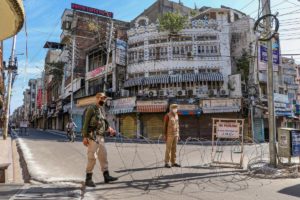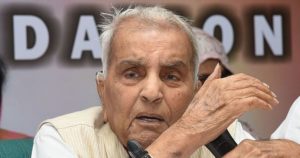As I followed the passing of Triple Talaq bill in the Indian Upper House, I was reminded of my mother, Pramila Dandavate, who was distraught with denial of justice to Shah Bano and raised a revolt against the ambivalence of her own party on matters of bringing justice to Shah Bano.
“Mohd. Ahmed Khan v. Shah Bano Begum” [1985 (1) SCALE 767 = 1985 (3) SCR 844 = 1985 (2) SCC 556 = AIR 1985 SC 945], commonly referred to as the Shah Bano case, was a controversial maintenance lawsuit in India, in which the Supreme Court delivered a judgment favouring maintenance given to an aggrieved divorced Muslim woman. The then Congress government, panicky in an election year, succumbed to the pressure of Muslim orthodoxy and enacted a law with its most controversial aspect being the right to maintenance for the period of iddat after the divorce, and shifting the onus of maintaining her to her relatives or the Waqf Board. It was seen as discriminatory as it denied right to basic maintenance available to non-Muslim women under secular law.
Shah Bano, a 62-year-old Muslim mother of five from Indore, Madhya Pradesh, was divorced by her husband in 1978. She filed a criminal suit in the Supreme Court of India, in which she won the right to alimony from her husband. However, the Muslim politicians mounted a campaign for the verdict’s nullification. The Indian Parliament reversed the judgement under pressure from Islamic orthodoxy. The judgement in favour of the woman in this case evoked criticisms among Muslims, some of whom cited Qur’an to show that the judgement was in conflict with Islamic law. It triggered controversy about the extent of having different civil codes for different religions in India. This case caused the Congress government, with its absolute majority, to pass the Muslim Women (Protection of Rights on Divorce) Act, 1986 which diluted the judgment of the Supreme Court and restricted the right of Muslim divorcées to alimony from their former husbands for only 90 days after the divorce (the period of Iddah in Islamic Law). However, in the later judgements including Daniel Latifi case and Shamima Farooqui v. Shahid Khan case, the Supreme Court of India interpreted the act in a manner reassuring the validity of the case and consequently upheld the Shah Bano judgement and The Muslim Women (Protection of Rights on Divorce) Act 1986 was nullified. Many Muslims including All India Shia Personal Law Board supported the Supreme Court’s order to make the right to maintenance of a divorced Muslim wife absolute.
The question that arose in my mind was, “What would be the reaction of my mother today?” I found an answer. My mother was committed to social justice. She was particularly vigilant on matters related to women’s rights. On these two issues, she did not let electoral politics get in the way of her activism. My mother was an ardent fan of social reformers like Raja Ram Mohan Roy, Jyotiba Phule, Savitribai Phule and Hamid Dalwai. During the period when Shah Bano was fighting for justice and Arif Mohammad Khan revolted against Rajiv Gandhi’s political expediency, my mom not only supported Arif Mohammad Khan, but also accommodated Shah Bano in our home for some time. She confronted her party’s national executive to take a firm position on Muslim Women’s rights. I have witnessed fierce arguments between her and Syed Shahabuddin on this issue. At that time, both of them (my mother and Shahabuddin) were General Secretaries of the Janata Party. She failed to get the party to take a principled stand and that led to several days and weeks of heated arguments in our home.
My mother wanted justice not only for Muslim women but for all women. She organised a nationwide movement for an anti-dowry law and campaigned relentlessly until her own private member bill turned into a law. She organised protests in Deorala where Roopkuvarba Kanwar, a Rajput woman, was immolated in adherence to the tradition of Sati. The original inquiries resulted in 45 people being charged with her murder; these people were later acquitted. A much-publicised later investigation led to the arrest of a large number of people from Deorala, said to have been present in the ceremony, or participants in it. Eventually, 11 people, including state politicians, were charged with glorification of sati. On 31 January 2004, a special court in Jaipur acquitted all the 11 accused in the case.
I remembered her relentless efforts to bring justice to Maya Tyagi, a young woman from Baghpat, who was raped by the police in custody and paraded naked in the market.
Every time she heard of atrocities against women, Pramila Dandavate rushed to protest or protect them. If she were alive today, she would have taken the opportunity to generate a nationwide debate on Triple Talaq. She would’ve partnered with Muslim Satyashodhak Mandal to expand the topic to not just the plight of Muslim women but of all women in India. She would have been on the vanguard of a mass education campaign. She would have supported a comprehensive bill to provide security to women in their marriage, no matter which religion they belonged to. She would have made sure that the bill was not drafted in a manner that appeared against a certain community, but for all women. She would have insisted on referring the Bill to the Select committee and would have organised a series of seminars around the country to elicit ideas for securing the rights of women.
As a socialist committed to social reforms, my mother believed that only a secular state would bring justice to women and to other disadvantaged sections of the society. She also believed that social reforms that are aimed at unjust religious practices should be led from within the community, in order to avoid perception of affront from another religion. That is why she supported Hamid and Mehrunisa Dalwai. She was radical in her beliefs and relentless in seeking legal reforms to bring social justice.
I remember my mother Pramila Dandavate today. She would not have used this occasion to defeat the bill and to restore status quo, but to generate a nationwide debate and a movement against social injustice. She would have also exposed hypocritical politicians who have defied polygamy laws and not faced consequences.
So my take away from the passing of triple Talaq law is: it is a perfect occasion to generate a discussion on all contentious issues, including interference of religion in politics, injustice to women, Uniform Civil Code, and many other issues that have been sidelined because of vote bank politics. Let this occasion not become a reason for aggravating Hindu-Muslim conflict but an occasion to hold the government responsible for taking steps that ensure social justice and establishment of a secular legal framework for India.
(Uday Dandavate is Co-Founder and CEO, SonicRim Ltd.)




